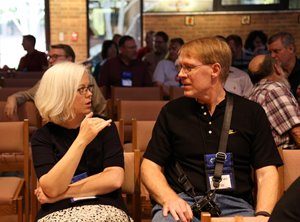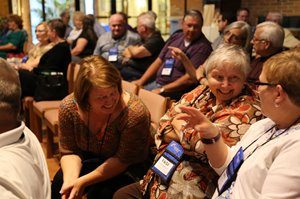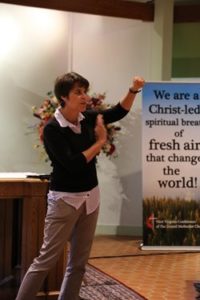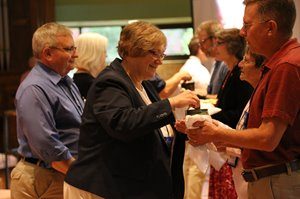
Rev. Jonathan Nettles (right) gives a reflection on the events of Clergy School, including Bishop Steiner Ball’s sermon, and how the theme of Stewardship was shared with those gathered.
“Cast Bread, Communicate Grace”
There are good messages, and then there are messages that speak to my heart. Clergy school opened with a meaningful worship service which included communion, and a stirring message by Bishop Sandra Steiner Ball. She chose Ecclesiastes 11:1-8 as her primary text and started by sharing the context – this was a passage about sharing generosity, light in a world dealing with much darkness. The call, from the passage and our Bishop, to “cast bread, communicate grace” is clearly relevant and needed in a world which still contains much darkness. It may seem extravagant, but we need to take a chance. Sometimes we just need to reach down and give out of the goodness of our hearts because of God’s goodness to us.
There was much-distilled wisdom in the message and a reminder of how we are to live. She said the most important thing we could do for those seeking help is to treat them as human beings, whether we give or not. I couldn’t help but remember a man begging at an intersection. When I first stopped, he wouldn’t look at me and seemed a shell of a man. After a few moments he began to look me in the eyes and speak more freely, and it was as if he came alive as a person. Our Bishop’s statement that “generosity isn’t about handouts, but builds relationships rather than destroying them”, suddenly became a face. As I think back to the man at the corner, I see the life-giving power of this truth.As we face each new need we were encouraged to ask, “what is the generous, grace-filled, Christ follower response to this situation?” She encouraged us to honestly look at our hearts to see what they reveal. Are we more concerned with what we can do for ourselves, or with what we can do for others? If I’m honest, my heart is a mix, yet I long for more of God’s heart. I long for a more generous lifestyle, where I trust God and freely give – and where I let go of my strong urge to control the outcome of my giving. I want to silence the voice of scarcity that limits my giving, and reach a point where I give because I can’t help myself because I want someone else to enjoy the blessings of God which I have come to know. Bishop Sandra shared the connection between receiving God’s abundance and giving generously – we can’t have one without the other. So we receive and we give. We can’t see if our efforts will be fruitful, but we labor nonetheless. All we are called to do is to sow and not stop, to help those in need abundantly, to “cast bread, communicate grace” – and we only have one life to live. It’s so easy to get caught up in the demands and desires of this life, a life that goes by so quickly, and in the midst of it all, I just want to live it well.
Bishop Sandra shared the connection between receiving God’s abundance and giving generously – we can’t have one without the other. So we receive and we give. We can’t see if our efforts will be fruitful, but we labor nonetheless. All we are called to do is to sow and not stop, to help those in need abundantly, to “cast bread, communicate grace” – and we only have one life to live. It’s so easy to get caught up in the demands and desires of this life, a life that goes by so quickly, and in the midst of it all, I just want to live it well.
I didn’t plan on going to Clergy School. I had been away from the churches too much, and catching up seemed overwhelming. Maybe I would have tried to crowd it in if the topic had been more “spiritual”, but a few days focusing on stewardship just didn’t seem that appealing. I was a little uncertain about my decision, especially since I recognized the need for more faithful stewardship in my charge, so I mentioned my decision at a Staff-Parish Committee meeting. They also recognized the need and thought the time away might be a good investment. I was still a little reluctant, but went and hoped for the best.
The fellowship and worship were good as always, but it was the stewardship emphasis that I would have hated to miss. That short time helped me see things more clearly. I have preached and taught that stewardship is a primarily a spiritual issue, and I believed that on one level, yet my attitude toward attending revealed something different in my heart. I warned others against cynicism and a scarcity mentality, yet those very things were gaining ground in my life. In short, I saw some things about myself that I didn’t like, yet I also found myself in a space that lent itself to transformation and positive change.
It started with a meaningful communion service and an enthusiastic message by Bishop Sandra Steiner Ball. Lory Beth Huffman added several meaningful stewardship messages to the experience and shared her experience using the “Enough” resources by Adam Hamilton.
 Scott McKenzie gave a broad overview of some of the concerns regarding stewardship and provided some very practical ways to develop and nurture generous givers. Most of these resources and additional ones are in Scott’s books, “Bounty” and “Generosity Rising.”
Scott McKenzie gave a broad overview of some of the concerns regarding stewardship and provided some very practical ways to develop and nurture generous givers. Most of these resources and additional ones are in Scott’s books, “Bounty” and “Generosity Rising.”
His enthusiasm for stewardship, and his conviction of its importance worked together to renew my enthusiasm. Faithful stewardship in all areas of life obviously impacts the health and meets the needs of our churches. Looking deeper, that same stewardship is what resources us for mission and ministry in our communities and the larger world. A third aspect we sometimes overlook, stewardship is also a critical element in our personal spiritual growth. So generous giving of our various resources is a win-win situation for all involved, and yet we so often avoid that which has the potential to be life-giving.
 Recent statistics have convinced me that we have much room to grow, and stewardship is at the heart of that growth. I’ve heard 2% of United Methodists invite someone to church in a given year, and the average United Methodist gives 1% of their income to the church. If these are even close to true, then the culture around us is not the problem. Our potential is amazing, and we can choose to be much more than we are. I believe it has to start with giving up excuses and no longer blaming others, but rather accepting responsibility for our situation. The membership vows of prayers, presence, gifts, service, and witness remind us of our call to be faithful and generous stewards. They are not just duties; but rather a lifeline for each believer, for our churches, and for those we are called to reach.
Recent statistics have convinced me that we have much room to grow, and stewardship is at the heart of that growth. I’ve heard 2% of United Methodists invite someone to church in a given year, and the average United Methodist gives 1% of their income to the church. If these are even close to true, then the culture around us is not the problem. Our potential is amazing, and we can choose to be much more than we are. I believe it has to start with giving up excuses and no longer blaming others, but rather accepting responsibility for our situation. The membership vows of prayers, presence, gifts, service, and witness remind us of our call to be faithful and generous stewards. They are not just duties; but rather a lifeline for each believer, for our churches, and for those we are called to reach.
Scott shared about a mission trip to a village in Malawi, a poor country in Africa. Life expectancy is only 47. There is not enough food to go around, and mothers have to decide which child to feed. Yet, as the team prepared to leave, the villagers offered them the best of their limited food. They expressed their gratitude for the visit and insisted that the team members take their gift. Scott pointed out the pastor in a photo and shared that he died from starvation after that visit. It’s just not right. There are so many in desperate need, those across the world who lack food and those next door who don’t know Jesus. We have a wealth of resources and are so rich. Through embracing faithful stewardship and generous giving we have the power to make such a difference.
There are many practical things we can do to increase giving. Offering electronic giving, thanking those who are generous, pastors being aware of giving, regularly telling the stories of lives that have been changed, leadership expectations, and teaching and preaching throughout the year are just a few of these. Yet the real issue is a deeper one and calls for grateful and generous hearts that overflow with God’s love. That’s a work that the Spirit must do, but it’s up to us to pray and to create spaces in which the Spirit can work. It’s also up to each of us to offer our heart as one of those spaces. I hope and pray for a day when you and I, individuals and churches, will become much less concerned with us and our stuff, and far more concerned with being channels of God’s love in a world with such great need.
Check out all the Clergy School photos on our Flickr page here!
Jonathan Nettles may be contacted at nettlesjk@gmail.com